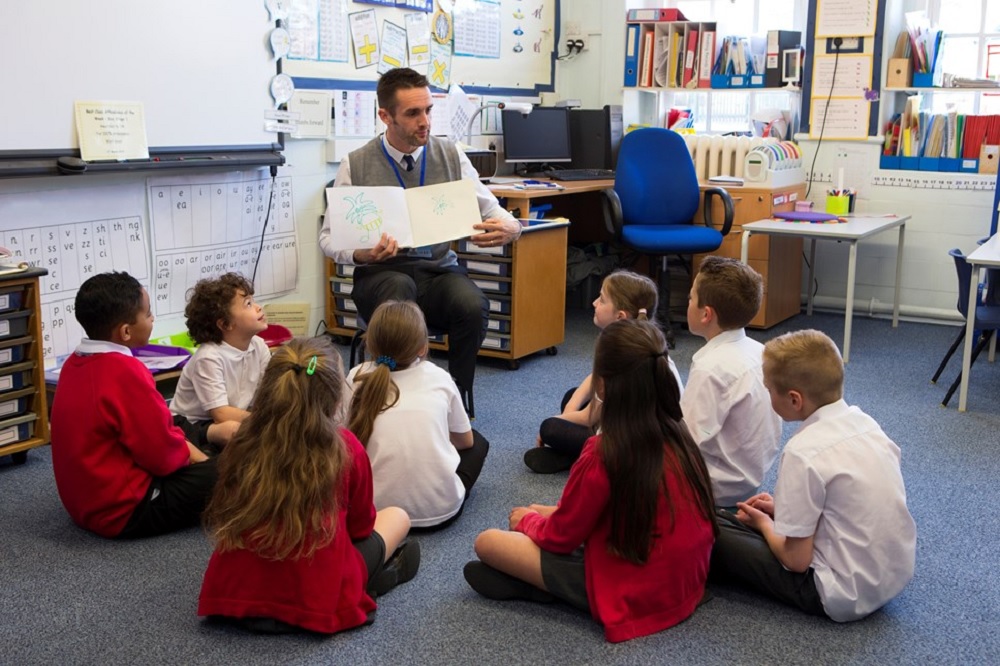How we can get serious about teaching Welsh in our English medium schools

Terry Mackie, Mathias Maurer and Barri Mock
Martin Johnes, one of our leading historians, made a passionate plea in these pages for greater understanding about the role of communities in the historical decline of the Welsh Language.
He reminded us that the whole question of decline is more than history -it is “an emotive topic”. He highlighted that English migration forces were the most powerful change agents in the decline – much more than the official language of school instruction being changed to English.
Community usage of English by Welsh-speaking children (the vast majority) did not spread much at all, because Victorian children failed to learn useful, transmissible English through their lessons in what was essentially a foreign language.
Standards of learner attainment overall during this period were significantly harmed by poor linguistic policy and practice; it was poor teaching practice based on an implausible policy that failed learners.
While not opposing in any sense Johnes’ main thesis about the primacy of communities and dominant language usage (the current meme of ‘herd immunity/community’ springs to mind) we would like to build on his lesser theme of the impact, and non-impact, of school linguistic practice and come right up to date with some considerations about Welsh teaching in English-medium primary schools.
We are positive that in this area of critical Welsh Language shortfall we think the biggest gains can be achieved in five years.
Our view is not simply that the failings of our Victorian language policies and practice are mirrored in the present Welsh Language curriculum for English-medium schools but also, perhaps more poignantly, that the New Curriculum for Wales on its own offers limited hope for improvement.
It is our opinion that the push towards bilingual education in English-medium primary schools is unlikely to make Welsh thrive towards the ambitious Cymraeg 2050 aim of 50% of English-medium pupils describing themselves as Welsh speakers when they leave school. As Meri Huws, former Welsh Language Commissioner, pointed out to the Senedd in 2018, no strategy (or targets) exists for English-medium schools to transform into bilingual institutions.
We conclude there is no actual plan for that to happen. The New Curriculum for Wales, in all its multiple documentation, has little to say about helpful language teaching methodology, time allocation and teacher supply.
Ill-defined
What are the present standards of teaching and learning in English-medium primary schools?
In the 2018 -19 annual report, Estyn is frank:
“In too many [English-medium primary] schools, pupils’ Welsh-speaking skills are weak, and Welsh does not have a high enough profile. [In Key stage 2,] pupils lack the capacity to speak confidently. This often reflects the weak quality of provision and the limited confidence of teachers in speaking the language in a range of situations.”
For profile read school leadership and time allocation. But even if taught for the suggested 10% of the timetable, progress is hindered in too many cases by the variable quality of teachers who frequently lack both training in effective language teaching methodology and the ability to speak Welsh to the required standard.
According to Estyn, too many pupils stall in KS2 after the good start they have made in Foundation Phase. This negative trend carries on in secondary education. Outcomes at GCSE are increasingly poor and numbers progressing to A-Level have more than halved since 2009/10, down from 410 to a mere 164 for all of Wales in 2018/19.
Most English Medium primary teachers are non-specialists when it comes to the teaching of Welsh as a second language. Because it is a loose framework, still to be fleshed out by schools in the run-up to implementation in September 2022, the new curriculum has not delivered the roadmap and compass teachers were hoping for.
In bundling Welsh, English, International Languages and Literature into one Area of Learning and Experiences entitled ‘Languages, Literacy and Communication’, priority for Welsh as a second language has been diffused and diminished.
In fact, English Medium schools and teachers have not gained any significant direction about effective teaching practice and professional development through the years of the New Curriculum for Wales’ development.
It is our concern that the foundations for learning Welsh in the English-medium sector are built on sand. The requirements for statutory teaching time and teacher standards appear ill-defined and inconsistently monitored.
We assert, notwithstanding the limitations of the New Curriculum for Wales, that better planning, better teaching practice and better outcomes for English-medium schools in Welsh are available and realisable in the short and medium terms.
As Kirsty Williams reminds us, this is “a curriculum designed by teachers, built for pupils”; implementation is still seven terms away and so all is to play for in upskilling the workforce and in decision-making for time allocations and curricular emphasis within schools.
The future of Welsh won’t be saved by education, as Martin Johnes rightly said.
But we envision a future where education can play a gradually more influential part in community growth of the usage of Welsh, if English-medium schools follow curricular priority by implementing sounder practice of language specialism and expert methodology. And if more specialist teachers are trained and more specialist roles are created in schools.

Value
We propose the following model:
1.) A programme based on the successful Welsh in a Year sabbatical scheme which trains specialist primary Welsh teachers. We propose that ideally 125 existing teachers are training full time for a year, but realise that financial realities might mean this will have to be reduced to half a week for a year. Additionally, 125 others who are seeking primary posts receive the same level of training.
Over 2 years, 500 more specialists are made available. Level B2 of the Common European Framework of Reference for Languages (CEFR) is a commonly cited minimum standard for language specialists and should be the aim of the course, together with a high degree of competence in up-to-date effective methodology. The annual cost of this scheme would be approximately £5m for half a week.
On their return to school after the training has completed, these specialists deliver discrete Welsh lessons to all Key Stage 2 classes, lasting 30 minutes, four times a week. These lessons are to be all teacher-led. Every school should have at least one highly trained Welsh-speaking language specialist.
2.) Every child in Wales follows a yet to be designed coherent, progressive national continuum of Welsh. This is an absolutely crucial point. Such a coherent, accumulative national language progression will allow the creation and sharing of high-quality planning, resources and methodology on a national scale, a task impossible if individual schools, clusters and consortia have to develop their own language progressions and materials.
The ‘sacred’ premise of the New Curriculum for Wales that schools should design their own interpretations of the curriculum is incompatible with the challenging priority that Welsh in English-medium schools presents. Non-specialist teachers do not have the expertise to design a high-quality language curriculum.
3.) Lessons will focus on acquisition and proficiency, and by the time pupils finish primary school, they will have developed a sound grasp of alphabetical phonetics and standard high-frequency vocabulary. Promising new materials are already in production for digital flashcards and much wider use of technology. Learners will be able to spontaneously use standard patterns with a high degree of fluency, providing secondary teachers with a secure foundation to build on.
The national continuum will allow for a smooth transition from primary to secondary school, without the need to fill gaps or re-teach basics. The aim is for all children to arrive at secondary school with the same core knowledge and skills.
Communities will always have the last say on language usage but we should at least make a better fist of giving our young people more effective tools and the learning space to engage as best they possibly can. Teaching is the pay-off area. Knowledge-rich teachers make for great learners.
It is going to be a big change and it will cost time, effort and money. But if Welsh is really ‘of inestimable value’ to our society, our culture and our heritage, then let us get serious about providing the very best teaching and learning in our English-medium schools, in every part of Wales.
Terry Mackie, former Head of School Improvement for Newport, is the author of ‘The Slow Learning Country: Out of the dim into the light’ (2019); Mathias Maurer teaches at St Athan Primary School, Vale of Glamorgan. Barri Mock, lead teacher for Welsh at Risca Community Comprehensive School, also contributed generously to this article.
Support our Nation today
For the price of a cup of coffee a month you can help us create an independent, not-for-profit, national news service for the people of Wales, by the people of Wales.






